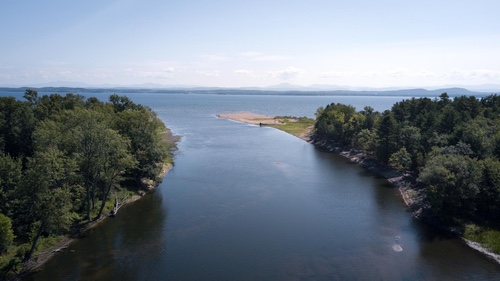A Yankee Notebook
NUMBER 2199
September 10, 2023
A Lot Happened Here
EAST MONTPELIER, VT – During the 1960s I taught high school English in a riverside village on the west side of Lake Champlain. Looking back, I can see that the situation for our small family was idyllic. But in my early thirties, I wasn’t quite ready for idyls; so after six years of very pleasant, if somewhat modestly remunerated, teaching and coaching, we left Willsboro and the Boquet River for greener pastures.
The years there, however, had been filled with historical interest. The falls in the river at the foot of the village had been the summer resort of local Abenakis, who had fished there for migrating salmon. During pre-Revolutionary days the land around the falls was purchased by an Irish-American veteran of the French and Indian Wars, one William Gilliland, who named the location Willsborough after himself, built a mill dam at the falls, and began inviting settlers to join him.
Later, during the Revolution, Gilliland was almost wiped out by foraging colonial militia and marauding Tories. He spent most of the rest of his life and fortune seeking recompense for his losses, but largely failed and died of exposure, broken in fortune and mind, on a local mountain on 1796.
There was a minor battle below the falls in 1814, when the British, frustrated in their attempt to raid the American shipyard at the falls of Otter Creek, Vermont, moved across the lake to plunder supplies of grain and powder at Willsborough, rowed the short mile upstream in bateaus, and confronted the mill owner. While the miller entertained the British officers with hard cider, a citizen ran to alert the militia (who, interestingly and in a bit of a contradiction of our current interpretation of the Second Amendment, ran to the armory to get their weapons). These took up position behind sand banks near the narrow mouth of the river and as the retreating bateaus – the Brits finally tumbled to what the locals might be up to – rowed past, enjoyed a bit of a patriotic turkey shoot. Once out of the river mouth, the Brits turned and fired their small field pieces at the sand bank, but couldn’t raise the muzzles high enough to clear the top of the bank. A good friend and former colleague of mine, Tom Spierto, who taught 8th-grade history in Willsboro and still summers there with his wife, has a small cannonball that one of his students dug out of the bank and brought him. (It’s also rumored that during the Thirties locals could find bottles of Canadian whiskey buried in the sand in the shallow water just offshore; the river was a popular dropoff spot for lacustrine bootleggers. But that’s history of a totally different era.)
Just this week, as I read my way through Revolutionary Roads: Searching for the war that made America independent and all the places it could have gone terribly wrong, (Bob Thompson, 2023), I came across the bit of history that fascinated me the most during the time we lived in Willsboro. Thompson, a lively writer, took the trouble to contact my friend Tom, who led him to the spot of greatest historical significance at the mouth of the river. This one is from the days of the Revolution.
You may recall that in 1776 the British landed thousands of troops in Quebec as the start of a pincers campaign to divide New England from the rest of the colonies. The infant United States Navy under Benedict Arnold, managed to slow the British fleet on the lake for, essentially, another year. Thus, not till 1777 did General John Burgoyne come down the lake toward what he hoped would be a hookup with the rest of the British army at Albany. Stopping in June at the mouth of the Boquet River near Willsborough – you can still find British army buttons and see the fire pits – the general grew vastly irritated at the hostility of the settlers, and made a fiery speech in which he hinted broadly that if the depredations of the locals didn’t stop, he might just unleash his Native American allies upon them to do their thing.
The settlers had thought they’d already fought that war, and far from being threatened, were infuriated. The Battle of Hubbardton followed a few weeks later, and shortly after that, hungry and very short of supplies, Burgoyne’s army stumbled south, encumbered by trees felled by the retreating Americans, and reached Saratoga in no condition to confront the massed army of regulars and militia that awaited them there.
These days the mouth of the river is pretty quiet. A local summer couple bequeathed the land for a park for swimming, boating, and recreation. But this placid spot has seen a lot of history thunder past. I can’t help but wonder how many of the happy kayakers are aware of it. Their serenity has been dearly bought.
Mouth of the Boquet River


